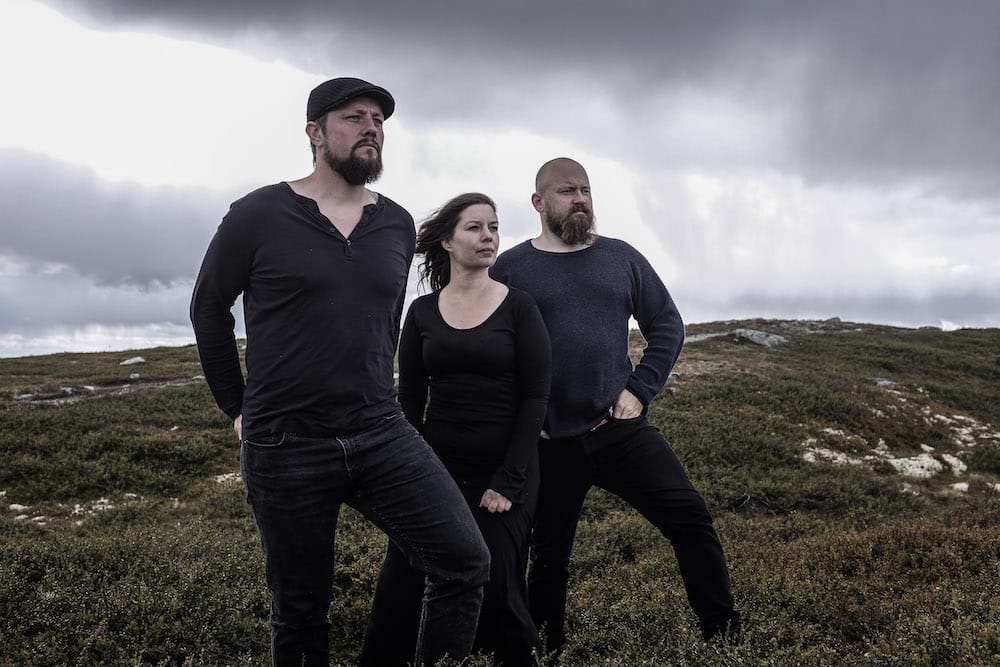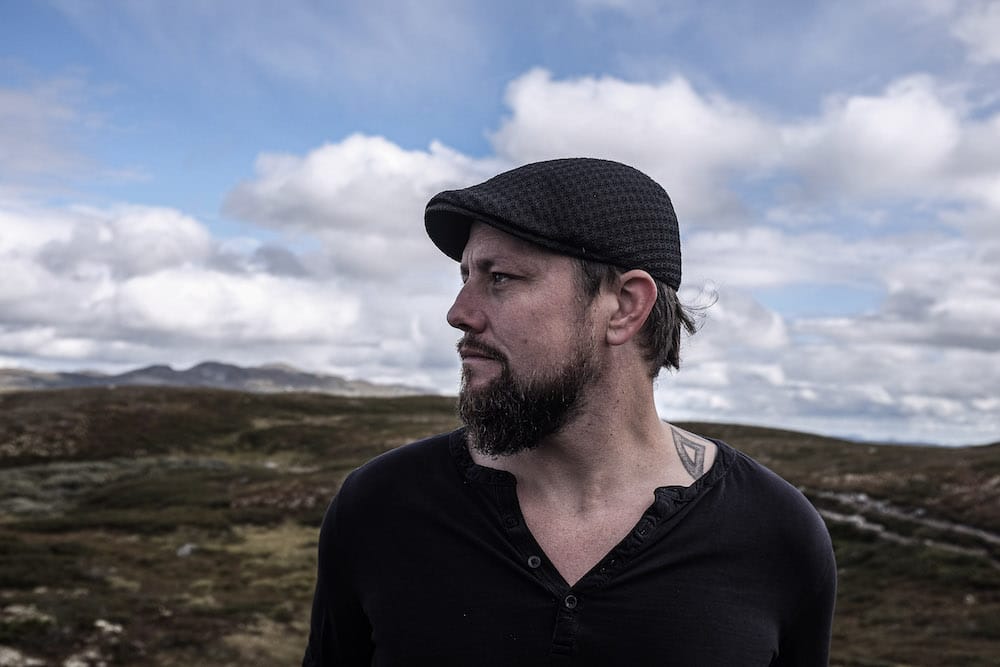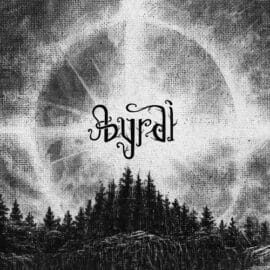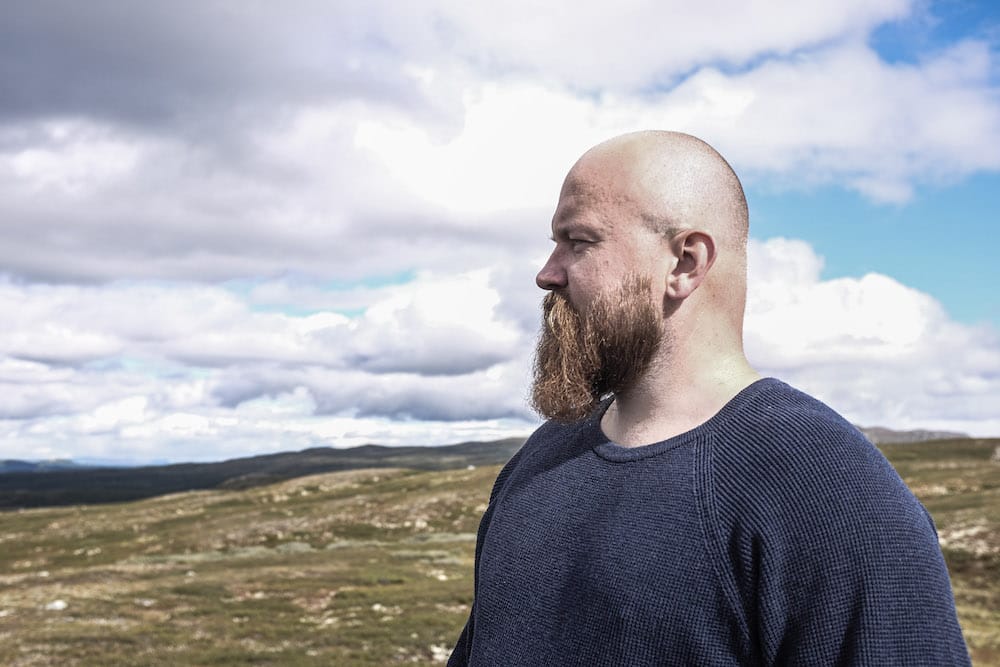Archaic-sounding folk msuic has been enjoying great popularity again for some time now. Bands like Wardruna and Heilung have started a real hype, Myrkur has received excellent reviews for her acoustic album „Folkesange“ and also BYRDI demonstrate how touching old music can still sound today with their new record „Byrjing“. In the following interview Nash Rothanburg and Andreas Paulsen explain why choral singing is an essential part of their expression, why they like to process personal matters in the form of mythological archetypes and which widespread misconception about Nordic beliefs can be cleared up on the basis of their new album.

How are things going with you at the moment? How well are you able to cope with the still tense situation under the pandemic?
Andreas: It is starting to get quite tiresome to be separated from everyone, even though I understand that there are many people in the kingdom worse off than me. I am lucky to be able to work from home and to take my daughter to kindergarten so that I can get my work done and she can get socialized with other children.
Nash: This „thing“ going on around the world these days has not affected me or my family in any notable way. I leave the madness and forced mass hysteria to the people living in urban areas.
You play an archaic sounding style of folk. How did your preference for this particular type of music develop?
Andreas: We have both been listening to folk metal since before we met 20 years ago, bands like Vintersorg, Thyrfing, Åsmegin, Enslaved and that kind of stuff. We are both huge Blind Guardian fans, even though we do not spend much time listening to their music these days, and as young men very inspired by Tolkien’s literary universe and the tantalizing pull from the norse myths.
So, even though I did not participate on the first BYRDI LP „Eventyr“ Nash and I played in a folk metal band together before BYRDI was created. So we made folk music before BYRDI, but not whole albums. But when we started to make the music for „Ansur:Urkraft“, the point was to make the music to the point, not too complicated and what we felt at that point was music that accompanied our spiritual deep dive into our norse heritage.
Do you enjoy other types of music that one might not suspect given BYRDI’s style?
Andreas: I play bass guitar in the black metal band Endezzma, which may not be all that surprising, but musically it is quite different from BYRDI. When it comes to listening to music I am currently listening to David Bowie, Renaissance, Genesis, and 35Tapes. And Opeth, of course. I have a daughter who is soon to be two years old, so in my house we play a lot of classical music like Mozart, Holst and Mahler, movie soundtracks like „The Sound Of Music“ and heavier stuff like Type O Negative and other electro/goth stuff. She is heavily into Thorbjørn Egner, so a lot of that, of course.
Nash: I have somewhat fallen off the listen-to-music-wagon. Before I was what you may call a metalhead, but in recent years I have found myself in a calmer landscape of sounds. I prefer old 70’s progressive bands such as Genesis, Camel and other various acts within the same expression. I also have a fondness for Norwegian progressive acts, such as Wobbler, Caligonaut and Jordsjø. Other native acts and artists I like to lend my tinnitus riden ears with are Aurora, Girl In Red and Odd Nordstoga.

Hymn-like choral singing plays a prominent role in your music. What is it about this particular stylistic device that excites you so much that you have made it a staple of your style?
Andreas: I used to sing in a church choir as a child, and I have always loved choral music. When I was about 7 years I saw the swedish movie „Ronja Røvardotter“ which has fantastic mostly a capella polyphonic vocal music, and to this day it brings me chills to hear and sing it. I was profoundly struck by the awesome emotion these rugged beasts of men were able to convey with their song.
In high school or upper secondary school – or whatever you call it – I had 3 years of musical education and a lot of that was linked to choral music. My main instrument was singing since I thought I could learn the guitar by myself. My teachers Ivar and Øystein were great inspirations and teachers and they introduced me to Mozart, ABBA, norwegian folk music and barbershop. We sang Mozart’s Requiem with 150 people in the choir and maybe 15-20 strings and other instruments. That was the deepest and most profound musical experience of my life, and I suspect it will probably stay that way throughout my lifetime. Ivar has sadly passed away, but I still try to impress him every time I work with the vocals in BYRDI. So the honoured dead directly work though BYRDI with our utmost love and respect.
So to answer your question – it is a combination of what melodies the lyrics are fitted with, and the tonal approach to our sound is what we find inspiring to work with musically. Both technically to sing it, but also if we have new ground to plow. In the band we use the term polyphonic more than the term choir, even though our tonality is rooted in classical western music theory, we break the rules of composition all the time and must do so to hit our mark musically, so to speak.
Your songs are arranged in a very calm and almost minimalistic way. How difficult is it to work with such modest means and at the same time make sure that the songs do not become tiresome?
Andreas: I think that we work with a kind of music that may be a bit tiresome to those who do not seek it and that is fine. We try to keep in mind the listener, but really we don’t put a lot of energy into that aspect of the process. It is mainly for us to like and if we are satisfied, hopefully those who like this kind of music will get a good vibe from it as well.
Nash: I would not use the word difficult, for me that is something negative and BYRDI does not allow negativity within its boundaries. We create music this way because this is how we express ourselves when we are in a creative process. We did not say to ourselves we needed to find a musical angle that we need to work with to be able to create. The creativity comes naturally from within without much difficulty.
I love to work with as few tools as possible as I like to see what we can create. Some bands use electric guitars, drums and bass, others use brass instruments and some use software. BYRDI uses acoustic guitars, hand drums, jaw harps and such. The modesty comes from the eye of the beholder since we have never thought of this as a modest way of creating something.
Whether one perceives music as exciting or tiring is of course subjective. What does a song have to offer in order to excite you?
Andreas: It is comparable to stand-up comedy, I guess. If it is convincing in a way that there is a defined character or identity that sets it apart from others, has a unique approach and brings some surprises to the table, I would say that is the most important for me. So, it depends on my mood. Some days production is important, some days it’s not. But it must evoke emotion.
Nash: Subjectively speaking a song needs to give me a certain atmosphere and energy to be a good song. It does not matter if it is mainstream pop, classical, folk, you name it. As long as it touches me I will find it exciting.
I suppose it’s not easy to reach the popularity of bands like Wardruna or Heilung with calm, unobtrusive music like yours. Does it bother you that you might only reach a niche audience in the long run?
Andreas: We are very excited and happy that people that come in contact with our music can gain something personally by that encounter. The ambition for BYRDI is to grow as musicians and at the same time create and harness good times and memories for when times are hard. That we make art together and feel that we understand better how to communicate that urge for every new round we go. Our natural modus operandi is not to make music for people to like, but for us to make music that we like ourselves. But at the end of the day I am a music fan and I cherish greatly the fact that other people enjoy our music.
Nash: BYRDI has never been about getting famous or known. If it had been about that I think we all would agree that we would be better off doing pop or rock, don’t you think? We all knew this from the start, that BYRDI is for us and our personal development and memories. But I am super stoked that people all around the world seem to enjoy BYRDI. I am eternally grateful for that.

Archaic sounding folk has been appealing to many people for quite some time now. Many of those fans seem to have a desire for nativeness. How do you think one can live more in tune with nature without drifting into escapism?
Andreas: This is something I think about a lot, and would probably take an evening just to get started. Nash and I have been talking about this for the last ten years. I think that a lot of young people all over the world lack direct connection to an overarching spiritual narrative or in another way to say it – they are lacking in knowledge of the history and culture of their country or surroundings. Maybe also from a connection to nature that is their very surroundings – if there is even anything left. That creates a huge void and is very hard to remedy, because it is so closely related to the building blocks of identity and it takes a lot of time, dedication, discipline and the will to accept that you may be surprisingly wrong about a whole lot of stuff when you try to relearn your connection to nature. Nature is so many things, it’s hard to grasp what we are a part of and what happens when we are cut off from the connection to nature.
Normally we would not go into politics but this time will be an exception because of the gravity of the situations we find ourselves in: Nietzsche foretold the mayhem that would befall us when the we killed the christian god, and that there was no way we could wash away all the blood that would be spilled as a consequence. Communism, nazism and fascism put the human race through the grinder, and we see today the woke disease eating both the universities, politics and now also corporations like an oppressive ideological mental disorder. Cancel culture and the rabid accusations that everyone who does not bow down to the ever changing demands of the utter minorities that peddle this utter filth – are marked as the devil of oppression. Sounds a lot like history repeating itself. My hypothesis is that these maniacal undercurrents ultimately stem from a disconnection from nature and subsequently as an overcorrection from a source of postmodernism and weaponized through a prism of lost cultural identity. This is not a pro-christian stance, but historically christianity superimposed itself on the cultures it came into contact with in Europe and usurped them more or less. So today when most people are mostly atheists or selfdescribing mildly agnostic if anything – there is a great void of spiritual and cultural self awareness, and our pagan cultural past is not only linked with nature – it is dictated by nature itself. On every level. So from a Norwegian or European view, I think it is only natural that what has been our natural way of life for thousands of years into the past sits in our genes and our forefathers act through our very being. When you stray too much away from what we are familiar with, we are bound to face consequences. Take care of your surroundings and leave them in a better state than when you inherited them yourself.
My best guess is put down your fucking smartphone routinely, log off the internet, don’t read the news everyday, read 10 classics a year, research your family history, plan hiking trips with friends of family – and read books about history, religion, mythologies, art, biology, music and all the fantastic stuff that is out there for us to enjoy. All that wisdom! And, at the same time try to be happy for all that is good in your life. For it is soon to end and will never happen again.
Get out in nature and feel the wind on your skin, the salt from the sea, the rock beneath your feet and seek out the beauty that is found in nature where you live. Or within travelling range of where you live. The quest for a pagan connection to nature is within us, but we need to actually seek out nature for the smell, the taste, the touch and the animist approach to what nature is. Make the sacrifice.
Nash: What Andreas said! Humankind has gone off its hinges and I personally choose to stay as far away from the crazy lefties as the nut jobs on the right as I can get. Every side screams about development, freedom and wealth, but nothing seems to happen. They throw accusations at each other instead of trying to find peace.
So, get off your phone, stay away from western and eastern mainstream news propaganda and seek adventures that may give something else than media induced fear. Roam nature and get back in touch with it. Humankind has lost one of its most vital assets by building concrete cities around themselves. We are a part of nature, no, actually we have a symbioses with it. Somewhere down the line someone thought we were above all and everything, but to me, seeing the ridiculous behaviour all around me it is apparent that by removing ourselves we also destroy ourselves and the real magic that lives within us and our symbiose with nature.
You released the opener „Solsnu“ from your latest album „Byrjing“ back in 2018, but the album has now been released three years later. What were you up to during this time period?
Andreas: We had a major fallout with the guy that was supposed to mix the album and that resulted in a quick mix and master for the song in connection with a concert we had on the date of Solsnu back in 2018. In the meantime children were born, workload and responsibilities increased, education, family and other commitments were given precedence. Finally Mattis „Malphas“ Elvestuen poured his hardpressed time and energy into the mix and master, and we finally could fulfil our contractual obligations with our label Trollmusic and release the record.
Nash: Life has progressed. I am just about to finish my degree from the university alongside the usual normal family life where one has to give away time to be able to keep everything in balance. That said I guess we have at least two more albums, meaning we haven’t put the music away.
 The song is said to have been streamed over a million times already – a pretty impressive number for an underground band. How do you explain the popularity of this song?
The song is said to have been streamed over a million times already – a pretty impressive number for an underground band. How do you explain the popularity of this song?
Nash: I have no idea. I think that question needs to be aimed at all the people listening to the song, don’t you think? I like it because of certain elements, but others may like it for other reasons. One thing is for sure: Never in my wildest dreams did I expect seeing the song currently having 1.3 million streams on Spotify. I would like to give every single streamer a huge thank you from the bottom of my heart.
According to your bandcamp info you recorded your second album „Ansur:Urkraft“ in various natural locations such as forests and mountains. In contrast, how did you approach the recording of „Byrjing“?
Andreas: Not entirely different. „Ansur“ we recorded ourselves both in my cottage in Hallingdal and my mothers cabin in the mountains of Valdres, but „Byrjing“ we brought along a technician to help us with both the setting up of the mics and do the recordings, but mixing the record as well. We recorded the album in my mothers cabin in Valdres, and the choir on „Solsnu“ was recorded in a small rural church in Landåsbygda.
So the main difference is that we had a more professional setup with mics and the recording process – less alcohol and fire rituals and more efficiency. We also did some overdubs and the recording of Giulia’s harp in a studio in Oslo.
On „Byrjing“ you picture Ragnarok, the end of the world in Norse mythology, as the beginning of something new. According to your songs, what comes after this supposedly final event?
Nash: Ragnarok has never been the end. That is a common misconception, because the norse pantheon has always been about seeing things in circles. If you have read the last couple of stanzas in Voluspa you would have understood that after Ragnarok a new, green and lush earth rises, and that once was shall be remembered by those who survived. We actually recite this part in „Solsnu“. When we die we give way to something new, stronger and better prepared, and it is a never ending circle, right? You can find this circle of life in every aspect and corner of the universe. So, Ragnarok is the end of the old, but the birth of something new and fresh, and that is the reason why the album opens with „Solsnu“.
„Byrjing“ is a journey from one state of being to another. It is deeply rooted in a personal rite of passage, but the theme, feelings and thoughts are universal. In other words, it is written from my perspective, but these themes touch us all at some point in life. The album is not about the loss and helplessness, but rather the way back into being someone again, the rebirth of me. Thus the last song, and the title song, is also the beginning of this new set of eyes I earned during this time of change.
The description of the concept of the record that you shared on social media doesn’t read like a literal continuation of mythology, but rather an allegory for personal experiences of loss, destruction and renewal. What is it about exploring such themes through mythological archetypes that appeals to you?
Andreas: The myths are very potent in that they convey wisdom from a time before electricity and oil. Hard times. When nature tried to kill you everyday and our culture was norse. It is surviving cultural artefacts from a time where oral transmission was the norm, and the images are from a time before christian values reached our shores.
For me it is a way to learn to think in a new manner, where the stories and the values that are represented by the different characters are more ambiguous and not immediately obvious. It takes time to get to know them since their symbolic values are multilayered and of such complexity, so that every time I think I have gained some wisdom it usually gets complicated very soon after. (laughs) It will probably take a lifetime of study.
But as it is with greek myths the norse myths have inbuilt some coded messages and they are the distilled wisdom of many thinkers and storytellers of the past, and to engage the mind with these stories we go viking into the unknown within. The archetypes/characters are a window into a storytelling past and whisper still the wisdom of the ancient world.

There were also some notable guest musicians involved in the album. To what extent did they influence the songs – did they simply play their given parts or did they give you creative input beyond that?
Nash: The contributors, except Mathias Gyllengahm, did not have any impact on the overall creativity of the songs, but they were all given permission to be creative within the framework we gave them. In other words, we asked these fine musicians to contribute with their experience to help elevate what already was created. The drums and percussion were already there, on a basic level, but Kjell Braaten was given freedom to do what he felt was good for the song. Trygve Ramnefjell and his flutes are probably the parts that were conceived and developed by him, if I remember it correctly.
Mathias and his keyed fiddle magic has its own otherworldly ability to hit something profoundly deep and true in us wherever he puts his tunes. He is probably the one musician that understands what BYRDI is all about and we are deeply grateful for all his ideas and creative input. He is also co-writer of the title song of the album.
We are deeply thankful for what these fine humans have done for the album and BYRDI. It has helped us fulfill our goals and intentions.
What do you have planned next for BYRDI?
Nash: At the moment nothing is planned due to school, work and family, but somewhere down the line, and given the right circumstances, we probably will record some new music again.
On Metal1.info we traditionally end interviews with a short brainstorming session. What thoughts come to your mind when you read the following words?
Folk from different countries: Nash: Probably a stupid answer, but I think of it as „folk music from different countries“. Nothing more, nothing less. If I like the music or not is a whole other ball park.
Secularization: Nash: In my eyes religion, I am not talking about your personal faith of belief, has only done men wrong. It was created to suppress, dictate and gain wealth and power at the expense of the „free mind“. Therefore I think it was a good idea to seperate state and religion.
Black metal: Nash: I rarely listen to new BM, but now and then I pick up good old albums from amongst others Burzum, Satyricon and Enslaved. If you are into BM you should check out Hymnr straight away. It is new, but the soul of the person who created the music is old.
Andreas: A treasure trove of fantastic music and a gateway for young people to mythology, psychology, literature, history and other exciting stuff.
Mythology in mainstream media: Nash: I think it presents an opportunity to expose and share ancient knowledge and perspectives.
Andreas: Often presented a bit clumsy, but I think it is getting an overall understanding that it is important. It is our cultural legacies and the ancients were not stupid, quite the opposite.
Climate crisis: Nash: Partly mandriven and partly naturally circular. And regards to the mandriven side of it I only see greedy politicians with empty promises and words of greed.
Andreas: A mix of manmade problems and natural phenomena. A lot of work to be done.
Streaming concerts: Nash: A good way to expose music and such, so why not?!
Andreas: A very good opportunity to get your music out there and if you are more on the artsy side it is a great way to try out new ideas for your music with various other forms of art. Get creative with it.
Finally, thanks again for your responses. I’d like to leave the last words to you:
Put down your phone, get off the internet, don’t watch the news everyday and read old books.
Dieses Interview wurde per E-Mail geführt.
Zur besseren Lesbarkeit wurden Smilies ersetzt.
